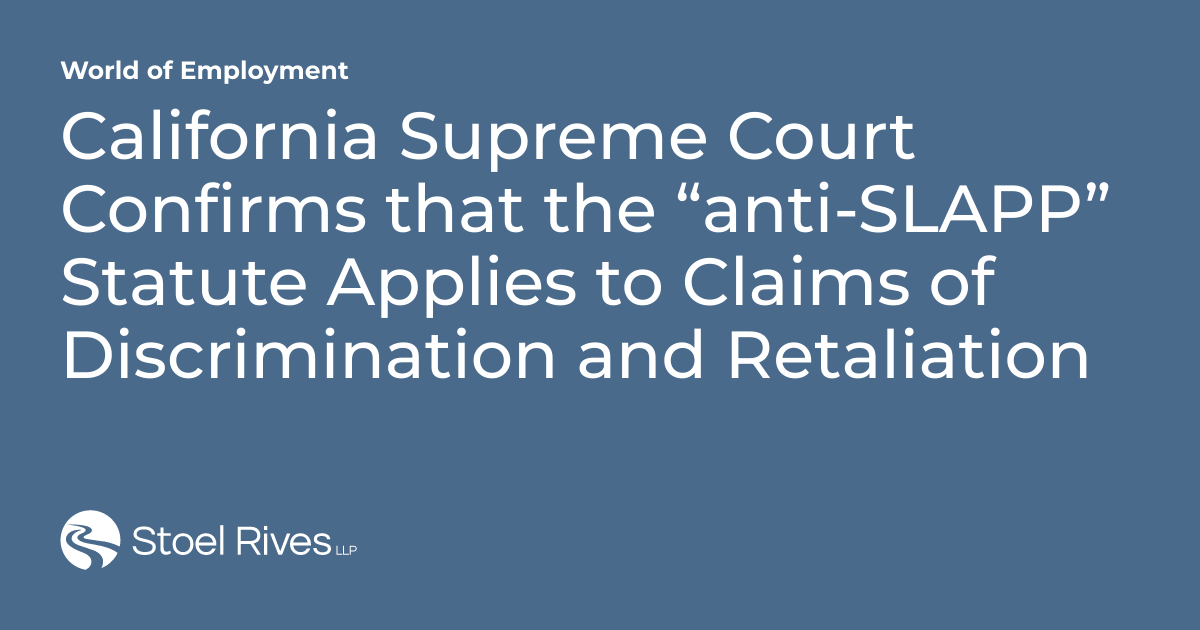California Supreme Court Confirms that the “anti-SLAPP” Statute Applies to Claims of Discrimination and Retaliation
Prior to the California Supreme Court’s decision in Wilson vs. Cable News Network, Inc., California Courts of Appeal were split on whether California’s anti-SLAPP statute applied to an employee’s claims of discrimination and retaliation. The Supreme Court in Wilson resolved this split in favor of the statute’s application, bringing a welcome bit of good (albeit narrowly tailored) news to California employers.
California Code of Civil Procedure section 425.16 is referred to as the anti-SLAPP statute. The term “SLAPP” refers to Strategic Lawsuits Against Public Participation, which are meritless lawsuits brought against critics in order to silence their criticism. Section 425.16 was first passed by the California legislature in 1992 due to its concern that real estate developers were attempting to bully project opponents into submission by filing frivolous litigation. This section provides a procedure for a defendant to challenge a pleading via a special motion to strike. In order to succeed on the challenge, the defendant must demonstrate that the claim or claims at issue arise out of protected speech or petitioning activity. If the defendant can make this showing, then the burden shifts to the plaintiff to demonstrate that the claim or claims have probable validity. If the plaintiff makes this showing, then the defendant’s motion is denied. If not, then the claim or claims at issue are dismissed and the defendant is entitled to his, her, or its attorneys’ fees and costs.
With this in mind, it is clear that the anti-SLAPP laws can be a powerful weapon if wielded correctly. And that is where the Supreme Court’s decision in Wilson comes into play, both with good news and bad news.
First the good news. Prior to Wilson, some California Courts of Appeal had held that the anti-SLAPP statute does not apply to claims of discrimination and/or retaliation by an employer. The reasoning of these courts was that a claim for discrimination and retaliation did not arise out of any protected speech or petitioning activity by the employer, even if the alleged adverse action implicated protected speech or petitioning activity. Rather, such actions arose out of the employer’s improper motivation in proceeding with the allegedly improper contact. For this reason, employer defendants could not satisfy the first prong of the anti-SLAPP statute.
The Supreme Court in Wilson rejected that reasoning and held that while claims for discrimination and retaliation do arise out of an employer’s improper motivation, they also arise out of the adverse action itself, which action may implicate protected speech. For this reason, and if the adverse action at issue does implicate conduct protected by the anti-SLAPP statute, the statute applies regardless of the allegations of improper motive.
This brings us to the bad news. Specifically, the category of cases and situations in which an employer’s alleged discrimination and retaliation implicates protected speech or petitioning activity for the purposes of the anti-SLAPP statute is limited. This is particularly true of private employers whose operations do not generally concern issues of public concern, which play a significant role in the relevant analysis. In Wilson, such conduct was implicated because the defendant was CNN – an international news organization reporting on international events. The same will generally not be true for a restaurant or general contractor who is alleged to have discriminated or retaliated against one of its employees.
Despite its narrow application, Wilson is good news for California employers and a case that needs to be kept in mind when defending against employment claims to determine if there is a way to tie such claims to protected speech. Beyond that, Wilson is also helpful in defending against arguments that laws of general application do not apply in the employment context. source
learn more about Anti-SLAPP:
Anti-SLAPP Law in California 1st Amendment Freedom of Press & Speech
California Supreme Court Confirms that the “anti-SLAPP” Statute Applies to Claims of Discrimination and Retaliation
Malicious Prosecution Actions Arising Out Of Family Law Proceedings: Proceed Carefully
Anti Slapp Law Resources:
Anti-SLAPP and Free Speech in Defamation & Emotional Distress Cases

